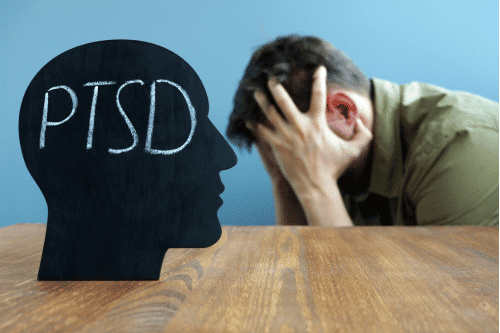Can PTSD Cause Bipolar Disorder?
Understanding how post-traumatic stress disorder (PTSD) interacts with Bipolar Disorder is vital for early diagnosis and effective treatment. These mental health conditions share overlapping symptoms, making it hard to distinguish one from the other. Some individuals with PTSD may develop mood symptoms resembling bipolar disorder, raising questions about causation and comorbidity.
Understanding PTSD and Bipolar Disorder
Definitions and Diagnosis
PTSD is a psychiatric disorder triggered by a traumatic event such as a natural disaster, sexual assault, or physical abuse. It involves intrusive memories, negative beliefs, and emotional dysregulation. Bipolar Disorder is a mood disorder marked by alternating manic episodes and depressive symptoms, often diagnosed using the DSM-IV criteria.
Mental illnesses like PTSD and Bipolar Disorder are classified under affective disorders and require evaluation by a mental health professional. Diagnostic criteria involve assessing symptoms of depression, mood fluctuations, and responses to stress-related illness.
Symptoms and Manifestations
PTSD symptoms include distressing memories, hypervigilance, and emotional detachment. People may relive traumatic memories and struggle with daily functioning. Bipolar symptoms depend on the episode—manic episodes involve increased energy levels and decreased need for sleep, while depressive episodes include fatigue and feelings of worthlessness.
In some cases, hypomanic episodes and mood swings overlap with post-traumatic stress symptoms. Misinterpretation of bipolar disorder episode types can delay accurate diagnosis and effective treatment.
Prevalence and Demographics
A review of prevalence data shows PTSD affects about 6-7% of U.S. adults, while Bipolar Disorder impacts roughly 2.8%. The bipolar disorder population is diverse and includes individuals from all backgrounds. Women are more likely to develop PTSD, especially after sexual assault or emotional abuse, while bipolar disorder shows no strong gender bias.
Psychiatric comorbidity, including comorbid anxiety disorders and cyclothymic disorder, increases in those exposed to traumatic or stressful life events. Hospital admission rates and suicide attempts are higher in individuals with both conditions.
Potential Links Between PTSD and Bipolar Disorder
Shared Risk Factors
Both conditions share environmental risk factors like childhood trauma, emotional neglect, and exposure to violence. Genetic predispositions and adverse life events also play a role. Studies highlight the impact of trauma symptom profiles on bipolar disorder diagnosis and course of illness.
Risk factors such as abuse in childhood, early onset of symptoms, and expression of trauma symptoms contribute to the development of psychiatric disorders, including co-occurring PTSD and Bipolar Disorder.
Trauma’s Role in Mental Health
Trauma has a significant influence on mental health conditions. A traumatic event can cause long-lasting effects on emotional stability. PTSD may emerge immediately, while Bipolar Disorder may develop or worsen due to trauma exposure.
Current study designs explore trauma’s impact on disease course. Earlier onset and increased depressive symptoms are often reported in bipolar disorder patients with a trauma history. Quantitative variables like age of onset and level of stress are used in clinical evaluations.
Overlapping Symptoms
Post-traumatic stress symptoms often resemble bipolar moods. Irritability, anxiety, emotional dysregulation, and changes in sleep patterns are common in both. Individuals may appear to have mania symptoms or depressive symptoms due to trauma but not meet the criteria for bipolar disorder diagnosis.
This overlap complicates diagnosis. Key differences may only be detected using structured assessments like the Clinician-Administered PTSD Scale and the Bipolar Depression Rating Scale. Both tools are critical for understanding symptom severity and treatment outcomes.
Scientific Research and Studies
Current Findings
Research from Bauer AM, Cordova MJ, and Andreassen OA highlights the impact of trauma on mental disorders. The BISS 303 Study and findings published in BMC Psychiatry and Behav Res Ther demonstrate links between traumatic experiences and bipolar disorder symptoms.
Systematic reviews and rapid reviews reveal a complex relationship. Previous studies using both prospective reports and retrospective reports show inconsistent results. Factors like exclusion criteria and inclusion criteria vary, impacting outcomes.
Debates on Causation
Some clinicians argue that PTSD cannot cause Bipolar Disorder but may unmask it in genetically vulnerable individuals. Others believe that the expression of trauma symptoms may appear as rapid cycling or bipolar symptoms, confusing the clinical picture.
The question “Can PTSD cause bipolar disorder?” remains debated. Studies often lack consistent domain structures or control over categorical variables and clinical variables. This contributes to differing conclusions.
The Role of Childhood Trauma
Childhood trauma has been linked to multiple psychiatric disorders. Emotional abuse, sexual assault, and physical abuse increase the risk of developing both PTSD and Bipolar Disorder. Trauma may affect mood stabilization and increase depressive severity.
Meta-analyses and studies like those published in Arch Suicide Res confirm that trauma has a negative impact on long-term mental health. Individuals with a history of trauma are more likely to experience suicidal ideation, distorted mood symptoms, and distressing memories.
Challenges in Diagnosis and Management
Complications in Differentiating Disorders
Symptoms often blur, creating diagnostic confusion. For example, emotional reactivity in PTSD may resemble mania symptoms. Bipolar disorder patients with trauma histories may show trauma-specific flashbacks or intrusive memories that are mistaken for psychotic symptoms.
Accurate diagnosis is essential. Misdiagnosis can lead to ineffective treatment and worsened mental illness. Clinicians must assess mood disorder patterns, trauma history, and the presentation of trauma symptoms over time.
Comorbidity and Its Impacts
Comorbid PTSD and Bipolar Disorder result in more severe symptoms and reduced treatment outcomes. Individuals often face poor daily functioning, disrupted social relationships, and increased psychiatric hospitalizations.
The impact of comorbidity is substantial. Studies suggest bipolar disorder patients with trauma histories have different responses to pharmacologic treatments, including a possible difference in lithium response. However, some research shows a lack of difference in treatment response, further complicating care.
Integrated Diagnostic Approaches
Mental health professionals must use comprehensive tools to differentiate mood symptoms from post-traumatic stress symptoms. Clinician-administered assessments, mood tracking, and interviews help reveal clinical outcomes and guide treatment strategies.
Integrated care models that include trauma screening and bipolar monitoring improve diagnosis. Data from the Cochrane Risk of Bias tool and National Health Service research stress the need for clarity in diagnostic procedures.
Treatment Approaches for Dual Diagnosis
Pharmacological Interventions
Treatment plans must be carefully tailored. Mood stabilizers such as lithium, valproate, or lamotrigine are used to manage bipolar disorder. For PTSD, SSRIs may help, but they can trigger manic episodes if not managed properly.
Combination therapy involving mood stabilization and anxiety control is often necessary. Pharmacologic treatments must be adjusted based on symptom profiles and a history of suicide attempts or rapid cycling.
Psychological and Therapeutic Strategies
First-line treatment for co-occurring PTSD and bipolar disorder often includes cognitive-behavioral therapy and trauma-focused interventions. Cognitive processing therapy, exposure therapies, and behavioral therapy help process trauma and regulate emotional responses.
Therapists focus on reducing avoidance behavior, challenging negative beliefs, and improving emotional resilience. These psychological treatments aim to reduce depressive episodes and prevent relapse.
Personalized and Holistic Care Plans
Effective treatment requires a multi-layered approach. Mental health care should address the impact of childhood trauma, daily stress, and emotional triggers. Treatment plans must evolve based on feedback, clinical variables, and changing symptoms.
At Treat Mental Health Tennessee, we focus on customized care. Our clinicians use mood tracking, trauma assessments, and therapy combinations to build treatment plans that support stability and recovery.
Coping Strategies for Affected Individuals
Building Support Systems
Social support is a protective factor for mental health. Connecting with trusted individuals, family, or mental health professionals can reduce distress and improve emotional balance. Peer support groups create space for shared experiences and mutual healing.
Support systems also help manage triggers related to trauma and mood instability. Structured routines and accountability improve quality of life.
Self-Help Techniques
Individuals can improve outcomes by using self-help methods. These include journaling, relaxation techniques, mindfulness, and setting daily goals. Lifestyle changes like limiting caffeine, maintaining sleep hygiene, and exercising regularly help regulate mood.
Tools like mobile apps or mood journals can track triggers, identify patterns, and support emotional awareness. These approaches enhance resilience and daily functioning.
Accessing Professional Help
Professional help is essential for those with severe symptoms or suicidal ideation. If you experience manic episodes, depressive episodes, or post-traumatic stress symptoms, seeking expert care can prevent escalation.
Treat Mental Health Tennessee offers evidence-based treatment strategies for co-occurring bipolar disorder and PTSD. Our team addresses both the trauma symptom profile and mood disorder patterns to create long-term recovery plans.
Clinical Implications and Future Directions
Can PTSD cause bipolar disorder? The answer is complex. While PTSD may not directly cause bipolar disorder, it contributes to symptom expression, earlier onset, and increased severity.
Clinicians must consider trauma exposure, genetic vulnerabilities, and emotional responses in bipolar disorder patients. Standardized research using domain 3, domain 4, and domain 5 variables will help clarify future directions.
At Treat Mental Health Tennessee, we deliver trauma-informed care and accurate diagnosis for psychiatric disorders. We treat the whole person—addressing emotional pain, behavioral symptoms, and environmental factors. Contact us today to explore effective treatment options and improve your quality of life.
FAQ's
Yes, certain antidepressants used for PTSD may induce mania in people predisposed to bipolar disorder. Monitoring by a doctor is essential.
Yes, with a coordinated treatment plan, both conditions can be treated simultaneously using a combination of mood stabilizers and trauma-focused therapy.
Research suggests individuals with bipolar disorder may have a heightened emotional response to trauma, increasing PTSD risk.
Therapists help manage clinical anxiety with evidence-based care. Life coaches guide intuition but do not treat mental health conditions.









